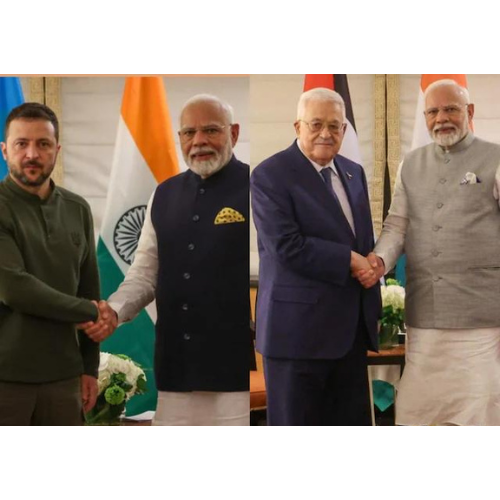In a pivotal moment for international diplomacy, Indian Prime Minister Narendra Modi recently engaged in crucial meetings with Ukrainian President Volodymyr Zelenskyy and Palestinian President Mahmoud Abbas in New York. These discussions, which took place during Modi’s three-day visit to the United Nations, highlight India’s growing role as a mediator in global conflicts. With the ongoing Russia-Ukraine war and the humanitarian crisis in Gaza, Modi’s meetings signal a concerted effort by India to contribute to peace and stability in troubled regions.
Context of the Meetings
The backdrop of Modi’s meetings is significant. The Russia-Ukraine war, which has persisted since February 2022, has had profound global implications, affecting economies, energy supplies, and food security worldwide. Meanwhile, the situation in Gaza has escalated, leading to a humanitarian crisis that demands urgent international attention. By meeting with both leaders, Modi aims to position India as a proactive participant in seeking resolutions to these pressing issues.
Modi’s Meeting with President Zelenskyy
The Indian Prime Minister’s meeting with President Zelenskyy on September 23 marked their third engagement in just four months. This meeting, requested by the Ukrainian side, emphasized India’s commitment to fostering dialogue and diplomacy. During their discussions, Modi reiterated India’s consistent stance advocating for a peaceful resolution to the conflict through diplomatic means. He expressed concern over the war’s impact, particularly on the Global South, indicating India’s awareness of the broader implications of these conflicts on developing nations.
The Indian government highlighted Modi’s assertion that he has always advocated for peace, mentioning his communications with various global leaders who share the sentiment that the war must come to an end. The discussions touched on potential pathways to peace, reflecting Modi’s desire to facilitate a dialogue among stakeholders involved in the conflict. Zelenskyy acknowledged India’s constructive approach, appreciating Modi’s efforts towards peace and reinforcing the importance of India’s role in international diplomacy.
New Zealand Imposes New Sanctions on Russia and Belarus Over Ukraine Conflict
Engagement with President Abbas
The day before his meeting with Zelenskyy, the Indian Prime Minister met with Palestinian President Mahmoud Abbas on September 22. This meeting was equally significant, given the escalating humanitarian crisis in Gaza. Modi expressed deep concern over the deteriorating security situation and reaffirmed India’s unwavering support for the Palestinian people. He highlighted India’s long-standing position on the Israel-Palestine conflict, advocating for a two-state solution as the only viable path to achieving lasting peace and stability in the region.
During the meeting, Modi called for a ceasefire and the release of hostages, urging a return to dialogue and diplomacy. His remarks reflect India’s historical support for Palestine, having been one of the first nations to recognize its sovereignty. By reiterating India’s commitment to providing humanitarian assistance, Modi aims to bolster international efforts towards alleviating the suffering in Gaza.
India’s Diplomatic Strategy
The Indian Prime Minister’s dual meetings with Zelenskyy and Abbas illustrate India’s strategic diplomatic approach in navigating complex geopolitical landscapes. India’s foreign policy has increasingly emphasized the importance of multilateralism, dialogue, and peaceful conflict resolution. By engaging with leaders from both Ukraine and Palestine, Modi is not only addressing immediate humanitarian concerns but also reinforcing India’s commitment to being a responsible global player.
India’s efforts are particularly crucial given the rising tensions and conflicts around the world. The nation’s historical ties to both Ukraine and Palestine allow it to serve as a neutral mediator, fostering dialogue and understanding between conflicting parties. Moreover, India’s unique position as a member of the Global South enhances its credibility as a peace advocate.
As global tensions rise, the significance of the Indian Prime Minister’s meetings in New York cannot be overstated. They reflect a proactive Indian foreign policy that seeks to address conflicts through dialogue and diplomacy. By engaging with both Zelenskyy and Abbas, Modi is positioning India as a key player in international peace efforts, aiming to contribute to solutions for two of the most pressing crises facing the world today. As the international community watches closely, Modi’s diplomatic engagements could pave the way for a renewed focus on peace, stability, and humanitarian assistance, fostering hope for a resolution in these conflict-ridden regions.


